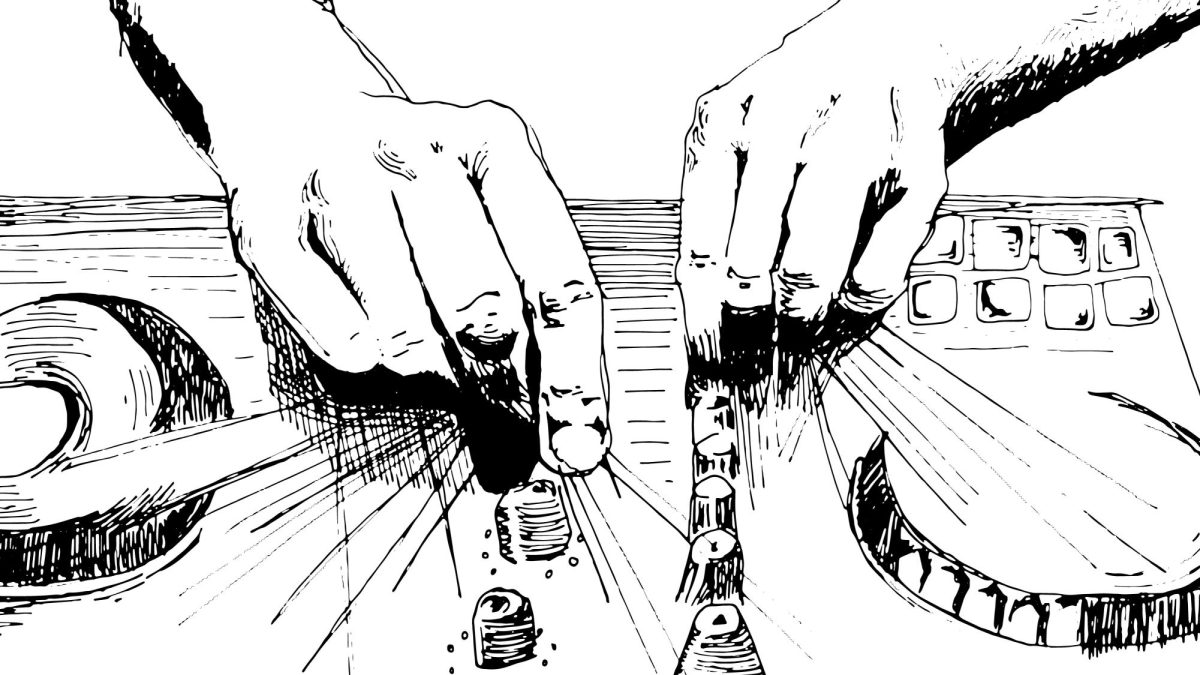
From singing in a punk band in California to writing and acting in New York, Jibz Cameron, also known as Dynasty Handbag, has worn many hats as an artist. Even at just seven years old, punk and improv-loving Cameron knew she was destined to be a performer. “You know, I always wanted to be on stage, I always loved improv theater,” Cameron said in her artist’s lecture for the studio art and art history department’s Class of 1960 Scholars Lecture Series this past Wednesday.
Cameron’s talk focused on the influences that shaped and inspired her latest piece, Titanic Depression. The performance, which first premiered in 2023 at Pioneer Works in New York City, is a farcical adaptation of the 1997 film Titanic.
As a child growing up in rural California, Cameron was inspired by artists like Prince who were known for adopting multiple personas throughout their careers. “Prince was my first [moment] when your brain breaks when you’re a kid, and you’re like, ‘Oh! Wait a minute,’” she said during the lecture. “I had started to absorb [that] this is a whole character that you create, and you build out a language, a style, a new person that kind of holds what you want to deliver to the world.”
As she grew older, Cameron found her calling in punk and rap music. “When I was an early teen, I got sort of politicized by punk and rap music,” she said in an interview with the Record. “I was learning from X-Ray Spex and Poly Styrene, and they were talking about ‘fake fakeness’ before it was a thing, manufactured identity, and the public enemy … and those kinds of things really moved me. And I think it also made me feel like art was this container where you could say all this shit.”
It wasn’t until Cameron moved to San Francisco in the early 90s that she was able to experiment fully with her art. She enrolled in the San Francisco Art Institute and joined a punk band called The Roofies. “We were just sort of filthy and offensive,” she said. “It was kind of like a garage band, and we did a lot of 60s surf guitar type stuff. And I sang.”
After her time with The Roofies, Cameron started an all-female band with her friends called Dynasty, which eventually led to the development of her persona as Dynasty Handbag. “I started this project, and I just keep going,” she said during the lecture. “It’s not clearly a character. It’s more of just a vessel to do whatever I want in performance.”
After spending her early years as an artist in the San Francisco punk scene, Cameron decided to move to New York City to pursue her dreams of becoming a performance artist. However, she soon found that performance spaces in New York were not what she had imagined.
“I moved to New York City to take over the town and be an actor, but I soon found that I didn’t like it there,” she said during the lecture. “I didn’t like the stand-up comedy world, which I first came to. It was very homophobic, very fatphobic, and racist. I was just like, ‘This is not my people. I can’t do this.’ And then, the acting stuff was just so miserable and competitive, and I didn’t want to look like a woman, really, whatever that is.”
Despite her initial disillusion with the performance scene in her new home, Cameron kept performing as Dynasty Handbag at downtown venues. The persona soon grew popular in the queer performance scene. “It was really the queers and the downtown art people who kept me alive in this world,” Cameron said during the lecture. “There was a language around it in New York, that was where [performance artist] Laurie Anderson was from, and there was all this legacy of that there, and I felt very understood in what I was doing.”
In 2007, Cameron began working as an indie screenwriter, producing a short film titled The Quiet Storm.
Cameron decided to move back to California in 2015. This time, she chose Los Angeles, wanting to try her hand in multimedia artwork. However, she found herself gravitating toward performance art again and started a variety show called Weirdo Night.
The show was intended to provide a space to bring together art, performance, and comedy. “Weirdo Night has become one of my favorite things I’ve ever done,” she said to the Record. “I get to meet all kinds of artists. It’s very inclusive. I go all over the map, and I think to give you a little bit of an overview of these kinds of worlds — think female music scene, or weird punky freaks being queer. And I get to bring it all together. With my improv skills and the humor I have, I can weave it together and make everything make sense in this special zone that we all get to have.”
While in Los Angeles, Cameron was also able to produce a short film titled Garbage Castle. Then the show, sold to FX Networks as a potential television series, was canceled due to the COVID-19 pandemic, and Cameron’s other on-screen work started to slow down. During this time, Cameron decided to focus more on a narrative piece that she could put together later. Coming out of the COVID era, Cameron had finished writing Titanic Depression, which uses all her past experiences to mold the story of Titanic into a social commentary on queerness, liberalism, the Guggenheim Fellowship, and much more.
For Cameron, the piece is a culmination of everything she has wanted to say to the world but hasn’t found the medium for. “I think it does sort of embody all the things that I am interested in,” Cameron told the Record. “That was sort of the dream, to be able to do that and have the resources to do that. And it’s also just very fun to perform because it’s very silly, and I get to just be on the stage for an hour and interact with these characters and the audience.”
Cameron will be performing Titanic Depression at the ’62 Center at 8 p.m. on Oct. 30.







